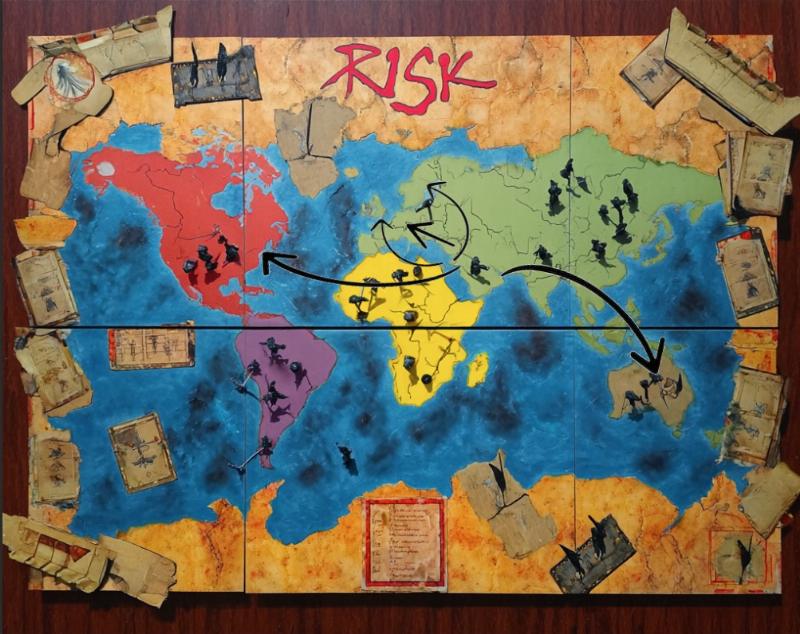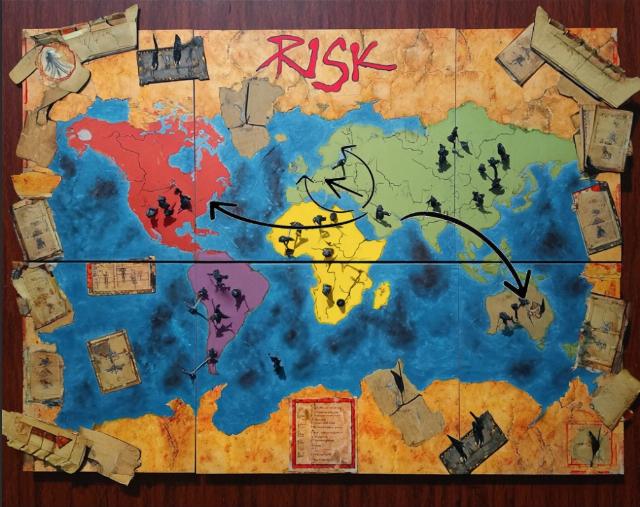


In the board game RISK, the goal is world domination. You achieve that by battling other players within and across continents. The best strategy is to take and hold Australia. Once secured, you can build up your troops while defending the single point of access to keep your opponents at bay, then attack in a methodical style and slowly expand.
This strategy doesn’t always work, but the notion of finding an easily defendable base where you can husband resources and use it as a launching pad to attack others is sound.
We’re actually seeing that strategy play itself in real-life competition that is anything but a game. Of course, I’m talking about Islam.

Image created by Vince Coyner.
Islam began in the second half of the 6th century in what is now Saudi Arabia. By the time Muhammad died in 632, the peninsula was largely Muslim. Over the next century, Islam would grow rapidly, sweeping across North Africa, through Spain, and into France.
In 732, Islam would meet its match in the person of Charles Martel, the de facto leader of the Franks. The Umayyad Caliphate had used its bases in North Africa and later Spain to advance into what is today France, behind the leadership of Abd Al-Rahman. Martel would appeal to the Pope for the funds necessary to defend Christendom.
When the forces met near Tours, the heavily outnumbered Frankish forces were victorious, and at the end of the day, the Muslim threat to Christendom was over.
While there would be other battles as the Caliphate retreated from France, Muslim control in Western Europe would be limited to Iberia for the next 800 years, where it would remain in slow decline until its final ouster from Granada in 1492.
Across the Mediterranean, at about that same time, the Ottomans conquered the unconquerable city, Constantinople, in 1453, and by 1653 would reach the gates of Vienna.
By that point, the Ottomans had control over much of southeastern Europe, stretching from Greece up to central Hungary and east to what is now Ukraine. The Ottoman Empire very much employed the Australia strategy, bringing resources from across its well-defended Empire up through Istanbul and deploying them throughout the Balkans as they prepared to support the siege. Polish King John III Sobieski would thwart their efforts.
Much like the Battle of Tours, the assault on Vienna was seen as a threat to Christendom and would represent the high-water mark of Muslim incursion into Europe. The following centuries would see the Ottoman Empire slowly retreat until its ultimate demise in the early 20th century.
Not that the Muslim world was monolithic, because it wasn’t. There were often competing caliphates and competition within caliphates, but the Islamic world never experienced anything resembling the kind of balkanization that characterized Christian Europe for most of its post-Roman history. Nor was Europe the only area that Islam sought to conquer, for at times it controlled all of India and much of Western China, stretching south to Indonesia.
Today, we live in a different world where caliphates in the traditional sense no longer exist. Instead of having one or multiple caliphates controlling large empires of Muslim lands, today there are over 50 countries where Muslims rule.
But just because we live in a different world doesn’t mean we’re living in a different world. Just as Muhammad and his successors sought to expand Islam to the ends of the earth, today we have a similar push, albeit from a far more grassroots source.
The leaders of most Muslim countries today are simply trying to survive the chaos of their third-world dystopias rather than trying to conquer the world in the traditional sense. Sure, there are a few Muslim nations that have used the money from oil to climb into the relatively developed world, or create a Potemkin façade of such, but they’re a minority. No, most are like Pakistan or Mali and often have challenges just keeping the lights on and their populations fed.
There are, however, hundreds of Islamic groups and terrorist organizations that seek to conquer the world and bring the entire planet (particularly Western civilization) into a caliphate. As in the game RISK, they depend on Muslim countries for support and sending new recruits. They are achieving results that sultans could only have dreamed of as Western countries welcome millions of Muslims.
Traditionally, Western leaders spearheading mass immigration always promise citizens that immigrants will assimilate and become productive members of their new nations. With these Muslim immigrants, though, that hasn’t happened.
Muslims mostly congregate in Muslim areas, maintain their traditions, fly flags of their former countries, and rally to the cause of terrorist organizations. Indeed, many maintain allegiance to Islam rather than their adopted countries, and they commit a disproportionate amount of crime, too. Often, natives are pressured into changing their culture to accommodate the new arrivals.
What’s the difference between 732, 1653, and 2025? Simple. In the former eras, Christians understood they were in a battle for their very survival and were willing to fight to defend their way of life against powers that wanted to destroy it. They were more than just nominally Christian; they were actual Christians with faith, confidence, and a belief that the civilization built by Christianity deserved to be defended.
Today, none of those things apply. Western civilization is largely ruled by globalists who believe the West is uniquely stained by the evils of slavery and colonization. For them, contrition requires welcoming everyone, regardless of the country or culture from which they come.
What’s worse, they tax their citizens to pay to support these newly arrived immigrants. And citizens who complain because they liked their country the way it was are labeled far-right racists and fascists and sometimes jailed.
But perhaps the single biggest difference is that Western leftists and leaders today take for granted the world they were bequeathed. They assume that because they enjoy freedom, prosperity, electricity, running water, etc., that they will naturally be there forever. They have no understanding of history and have no interest in how successful civilizations are built, nor sustained.
The outcome of all of this will be that numerous Western nations, particularly Europe, will be majority Muslim within a century. But the reality is that the West will be part of the caliphate long before the end of this century. The reason the British could control India, a nation of 200 million people, with less than 100,000 troops (less than 1/10th of 1% of the population) was because of the cooperation of millions of Indians in the army and the bureaucracy.
Muslims already make up far more than that in Europe, and it doesn’t take much for the impact to be felt, particularly with pandering politicians.
Islam is not compatible with Western civilization. Freedom of speech, religion, and thought are core to Western civilization. Islam opposes all of them. But it doesn’t matter as long as the West’s globalist leaders act as if their constituents are cogs in a machine who can be replaced by anyone from anywhere, regardless of their culture. In RISK, as in life, it’s the last one standing who wins. Unless something changes, Western civilization will find itself swallowed up in a caliphate of its own making, and freedom, prosperity, and actual civilization will be but distant memories.
